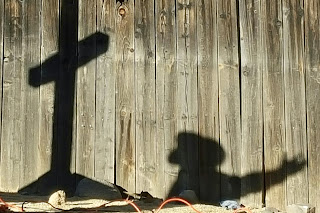Transparent Grace (Luke 22:54-65)
Journey with Jesus to the Cross (Monday, April 11)
Read Luke 22:54-65
The chapter opens with Judas’ decision to betray Jesus, and it closes with Peter’s decision to deny Jesus. In between, we have their argument over who is the greatest immediately after Jesus institutes the Lord’s Supper.
It is not a pretty picture. Here Jesus is, facing the darkest moments of his life, and his best friends are fighting, sleeping, running, betraying, and denying him.
At first, we’re amazed at their fickleness. But then, taking a look at our own lives, we’re not so quick to condemn. For we find ourselves quite as fickle as them.
How many times have we made promises to Jesus only to break them moments later? How many times have we slept through our prayers or run from our fears like those disciples did?
No, we dare not point fingers. Instead, let us choose the way of forgiveness and grace even as all of them did (save Judas, of course). Consider this: all these stories of failure could have been swept under the rug. They didn’t have to be told. And yet they are. The disciples didn’t hide them.
How did the Gospel writers know to write about Peter’s denial of Jesus in the courtyard? Who told them? Peter, of course.
I was first struck by this thought several years ago when I ran across the 1951 movie, Quo Vadis, an epic biblical drama which was nominated for eight Academy Awards. I particularly remember a scene where the aging apostle Peter is preaching in a clandestine cave meeting. In his message, he tells the story of his failure to defend Jesus in his moment of need. I found it to be a moving testimony of humility, forgiveness, and grace.
I wondered at the time, “what would compel a man to publicly tell his most shameful story? Is it possible that he was so overwhelmed by Jesus’ grace and forgiveness that he no longer felt the need to protect his own reputation?” I think so.
In contrast to this, I considered how carefully I guard my own reputation. I don’t want you to see my faults. Is it possible that, at least to a degree, I have not entirely embraced the full forgiveness which Jesus’ death secured for me? Again, I think so.
This is one reason why the regular observance of the Eucharist, and the meaningful walk through Holy Week is so important to our spiritual health. For in it we see both the gravity of our depravity (our sin put him there) and the immensity of Jesus’ love (his love held him there). When this vision captivates our hearts, we no longer need to hide, but can instead rejoice in God’s gracious heart of love and forgiveness.
Lord, thank you that the early disciples did not hide their faults, but rather held them up as evidence of your overwhelming grace and forgiveness. Help me to embrace your forgiveness, so I can see my faults in the light of your amazing grace.
---
Below is an excellent reading of "The Student," one of my favorite short stories. It is by Anton Chekhov, and is a poignant reflection on Peter's Denial of Jesus. Listen to it:

